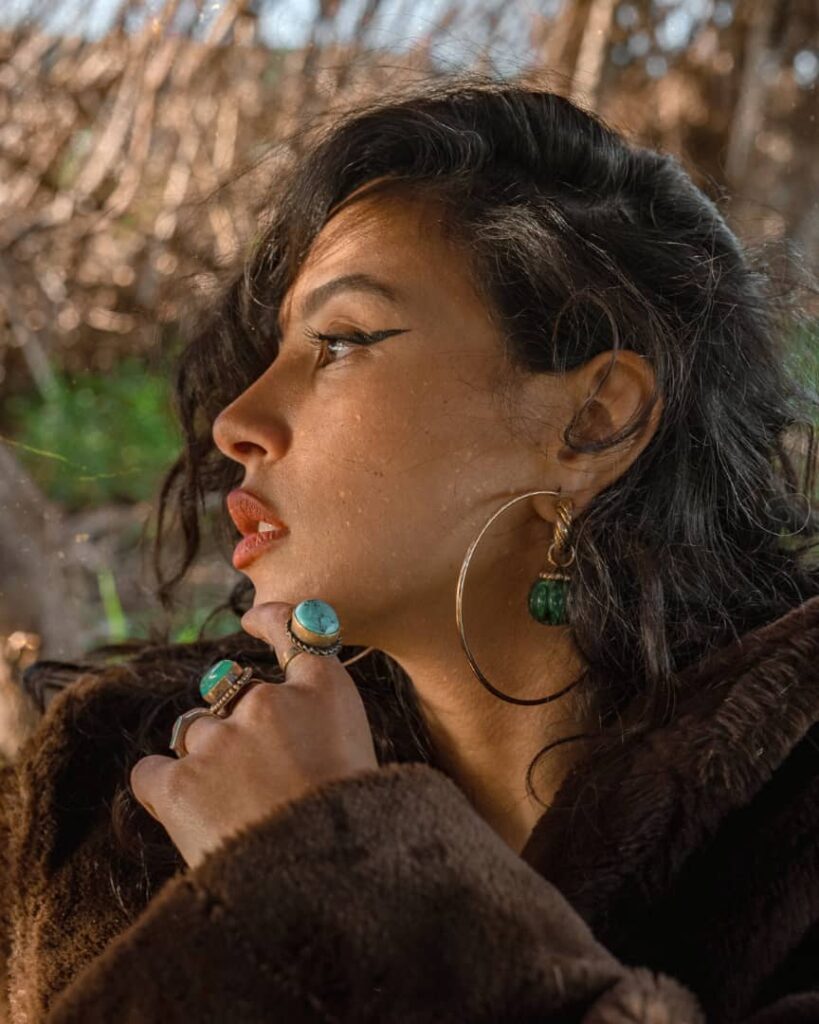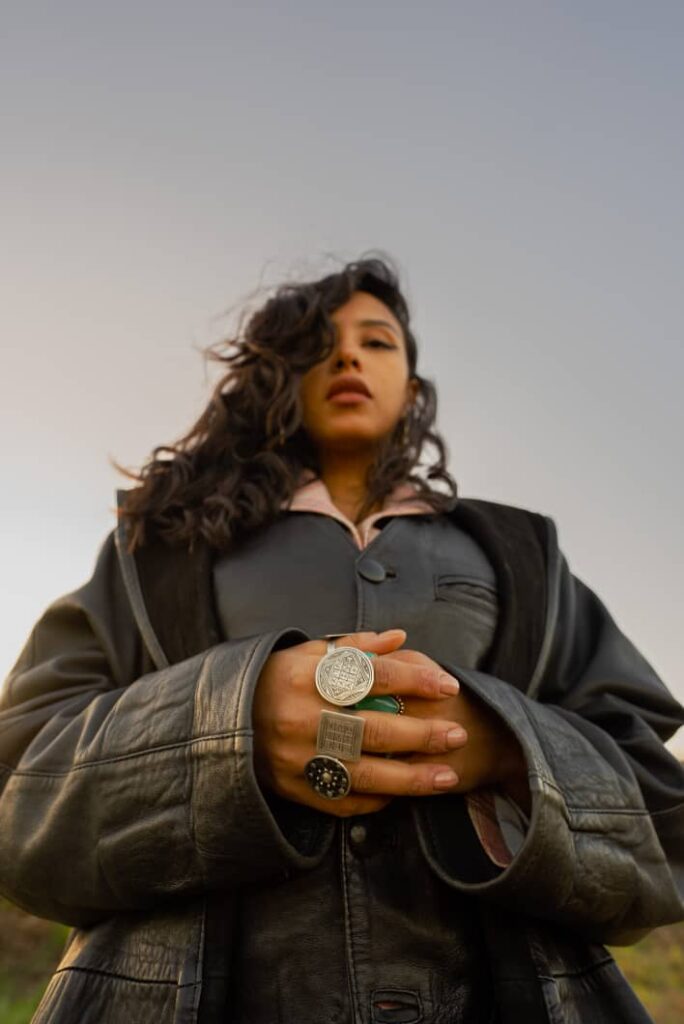By Emmanuel Daraloye
Last month, I came across Rhita Nattah’s music while randomly looking up new music on Audiomack, a music streaming platform that has become my go-to medium for new, emerging artistes. I dug into Rhita Nattah’s world by listening to her previously released singles, some as late as four years ago. I crowned it up by listening to her recently released debut extended play, Inner Warrior, which I later reviewed.
Recently, the Morocco-based artiste let us into her world in an exclusive interview with Afrocritik. Rhita Nattah states what makes her tick, the inspiration behind her art, and, more importantly, her journey in the music industry so far.
Emmanuel Daraloye: For the benefit of new fans who are only now getting to listen to your music, and now adore your art, who is Rhita Nattah?
Rhita Nattah: Rhita Nattah is a little girl who always followed her heart, and now a Fearless woman with principles, who respects art, and always says what’s on her mind.
Daraloye: On your new EP, Inner Warrior, you gave the fans a glimpse into your state of mind. This can be quite tasking. How were you able to make this happen?

Nattah: I think it’s easy to write when you are self aware and true to yourself. Also, when you feel things deeply, you find so many things to talk about. Sometimes they are not necessarily about your own experiences, sometimes it’s about a day in your life when you walked outside and saw something that seemed or sounded interesting to you. It could be a conversation in the souk (marketplace). It could be a child or an old man in the streets. I am also a self taught songwriter, so I don’t limit myself, and I have no rules. The only thing I believe in is to be reflective of the times when I should. As the Great Nina Simone said, “An artist’s duty, as far as I’m concerned, is to reflect the times.”
Daraloye: Your oldest single on Spotify was released in 2019, while this new EP was released in 2023. What happened in the time between these releases?
Nattah: In 2019, my producer, Samir El Bousaadi, and I released our first song finally after two years of learning independently, by creating music and writing lyrics. We were very shocked for a moment because two months after our song, “Not The Same,” that came out in November 2019, there was the COVID-19 lockdown, but we didn’t stop creating. Between 2019 and 2023 as you can see on Spotify and other streaming platforms, we released “Sinner,” “Talkin’ bout shit,” “Truth,” “Effects Of Thoughts,” (that was featured on Equal Africa and then Times Square billboard). We also released “#56,” and “Witness,” as a part of another project that we have with Moroccan singer, Sami Chaouki.
And the Inner Warrior EP that was released last month, February 2023, was actually finished in 2021, but it took us 6 months to finish the mixing and mastering of it. As fully independent musicians, we work with no budget at all, so it takes time.
Daraloye: Listening to your music gives music connoisseurs the feeling that you’re well grounded in the art. How did you become so well-versed? What has influenced your style over the years? What artists impacted you greatly while growing up?
Nattah: Thank you. This made me smile. I take the compliment. Well, since Samir and I create together, it’s a mix of our both worlds. As a child, I listened to what my family listened to. I grew up with my grandparents who listened to a lot of Al-Ala, Melhoun and Issawa. My favourite one since I was a child is aissawa. It’s a percussion-focused music style, with some deep words that we keep repeating in each song. The whole vibe was very spiritual to me, and it inspired and shaped my music composition; the beats in all of my songs are inspired by it, and by other traditional music types that Samir loves.
Growing up, and when I had a computer and YouTube, I discovered musicians like Amy Winehouse, Sarah Vaughan, Dinah Wahington, Queen Omega, Sizzla, Capleton, Led Zeppelin, Bob Marley, Nas, 2Pac, Damian Marley, and many others. These are the kinds of music I enjoyed as a teenager.
Samir’s father made him listen to Rock groups from a very young age. He always remembers listening, with his father, to groups, like The Beatles, Black Sabbath, Deep purple, and Rolling stones. At the age of 16, Samir learned guitar by himself while being inspired by several Metal bands like Pantera, Rage against the Machine, Korn, and Tool. He’s been composing and playing instruments since then.
Daraloye: As one of the many independent acts out there in a capital intensive industry, you have thrived so far staying self-sufficient. How has it been navigating these financial waters so far? How do you intend to garner more support in this regard going forward?
Rhita Nattah: Money was never the first goal, even though we all need it to survive. What we need more is peace of mind. Samir and I always created music without having the financial support; first because the music industry is non-existent in Morocco; second, because, in my country, art has been neglected for so many years, so artists’ royalties were and are still stolen by some private organisations.
I’ve said no to many opportunities that could have brought fame and money, because I was not feeling the music. I want to have 100% control over my music, lyrics and creative process. I respect art so much because it saves lives. As Fela Kuti said, we shouldn’t play with music. Everytime I get a deal that says the opposite, I know it’s not for me. As regards your question about financial support for my next projects, I really have no idea or plan. I’ll continue working as I always did, independently. If organisations in Morocco start distributing royalties in a fair way, I will have no problem financing my projects, since my music is well streamed in Morocco and outside.
Daraloye: Collaborations are sometimes an avenue to explore collective artistic strength. Which artistes do you look forward to working with?
Nattah: There are so many artists I love and respect and connect to their music, some of them will be in my next projects (can’t say the names yet, hahaha). Other artists I would love to work with are James Blake, Tool, Hiatus Kaiyote, Robert Plant, Sizzla, and Rick Rubin.
Daraloye: We are just three months into the year and there’s still a lot to unpack. Should the fans be expecting a debut studio album later in the year?

Nattah: More music is coming, of course, and an album, too. I can’t say if it’s going to happen by the end of the year, since as I told you, as a fully independent, it takes so much time, but we are already working on it.
Daraloye: Would any track off this EP have an official music video?
Nattah: I know people love seeing a face, but I’ve always focused on music only, wanting to have my own sound, shape it and master it. So I’ve ignored visuals completely. My heart belongs to melodies, and words. I’ll work more on visuals now that the sound of Rhita Nattah is there. However, the EP has crazy 3D visuals that you can see on lyric videos on YouTube and Canvas for Spotify. They were made by the amazing artist, Husam Minawi, who I enjoy working with. More visuals for the EP are coming. Stay tuned.
(Stream Inner Warrior here)
Emmanuel Daraloye is Africa’s Most Prolific Freelance Music Critic. He has over 500 album reviews in his archive.




